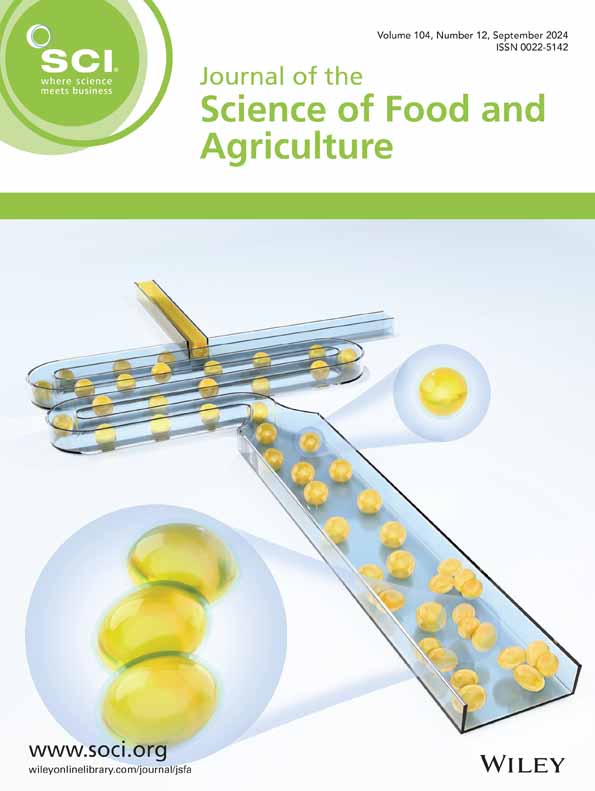求助PDF
{"title":"Exploring leaf proteins from agricultural waste for sustainable nutrition.","authors":"Charanjeet Kaur, Gurkanwal Kaur, Surekha Bhatia","doi":"10.1002/jsfa.70221","DOIUrl":null,"url":null,"abstract":"<p><p>The present review explores the potential of leaf proteins as a sustainable and affordable solution to meet the increasing global demand for dietary proteins, driven by the environmental impact of animal protein production and associated health concerns. Leaf proteins offer numerous functional benefits, including an essential amino acid profile, reduced allergenicity, enhanced foaming, emulsification and textural properties. The underutilized green leaves exhibit substantial variations from plant seeds in terms of protein quality, omega-3 and omega-6 fatty acid profiles, and vitamin and mineral concentration thus having a potential role in combating global malnutrition. The paper delves into the distribution of leaf proteins, eco-innovative methods for their extraction followed by their purification and modification techniques. It further discusses functional attributes and nutritional properties such as amino acid profiles, antioxidant potential and bioactivities of leaf proteins to understand their potential consideration for use in the food and nutraceutical industries. The review also highlights real-world paradigms of the potential application of leaf proteins along with their challenges and constraints to be used as functional food ingredients. Advancing research and development to combat antinutrients, production challenges and consumer acceptance of novel functional foods can thereby position leaf proteins as a pivotal resource in addressing global food security. This comprehensive review thus seeks to elucidate the transformative potential of leveraging agricultural waste to meet the protein needs of a rapidly growing population while fostering environmental sustainability and economic resilience. © 2025 Society of Chemical Industry.</p>","PeriodicalId":17725,"journal":{"name":"Journal of the Science of Food and Agriculture","volume":" ","pages":""},"PeriodicalIF":3.5000,"publicationDate":"2025-09-29","publicationTypes":"Journal Article","fieldsOfStudy":null,"isOpenAccess":false,"openAccessPdf":"","citationCount":"0","resultStr":null,"platform":"Semanticscholar","paperid":null,"PeriodicalName":"Journal of the Science of Food and Agriculture","FirstCategoryId":"97","ListUrlMain":"https://doi.org/10.1002/jsfa.70221","RegionNum":2,"RegionCategory":"农林科学","ArticlePicture":[],"TitleCN":null,"AbstractTextCN":null,"PMCID":null,"EPubDate":"","PubModel":"","JCR":"Q1","JCRName":"AGRICULTURE, MULTIDISCIPLINARY","Score":null,"Total":0}
引用次数: 0
引用
批量引用
Abstract
The present review explores the potential of leaf proteins as a sustainable and affordable solution to meet the increasing global demand for dietary proteins, driven by the environmental impact of animal protein production and associated health concerns. Leaf proteins offer numerous functional benefits, including an essential amino acid profile, reduced allergenicity, enhanced foaming, emulsification and textural properties. The underutilized green leaves exhibit substantial variations from plant seeds in terms of protein quality, omega-3 and omega-6 fatty acid profiles, and vitamin and mineral concentration thus having a potential role in combating global malnutrition. The paper delves into the distribution of leaf proteins, eco-innovative methods for their extraction followed by their purification and modification techniques. It further discusses functional attributes and nutritional properties such as amino acid profiles, antioxidant potential and bioactivities of leaf proteins to understand their potential consideration for use in the food and nutraceutical industries. The review also highlights real-world paradigms of the potential application of leaf proteins along with their challenges and constraints to be used as functional food ingredients. Advancing research and development to combat antinutrients, production challenges and consumer acceptance of novel functional foods can thereby position leaf proteins as a pivotal resource in addressing global food security. This comprehensive review thus seeks to elucidate the transformative potential of leveraging agricultural waste to meet the protein needs of a rapidly growing population while fostering environmental sustainability and economic resilience. © 2025 Society of Chemical Industry.
从农业废弃物中探索可持续营养的叶片蛋白质。
在动物蛋白生产的环境影响和相关健康问题的驱动下,叶蛋白作为一种可持续和负担得起的解决方案,在满足全球对膳食蛋白质不断增长的需求方面具有潜力。叶蛋白提供了许多功能上的好处,包括必需氨基酸谱,减少致敏性,增强泡沫,乳化和质地特性。未被充分利用的绿叶在蛋白质质量、omega-3和omega-6脂肪酸谱、维生素和矿物质浓度方面与植物种子有很大差异,因此在对抗全球营养不良方面具有潜在作用。本文深入研究了植物叶片蛋白质的分布、生态创新的提取方法、纯化和修饰技术。它进一步讨论了功能属性和营养特性,如氨基酸谱,抗氧化潜力和叶蛋白的生物活性,以了解它们在食品和营养保健工业中的潜在考虑。该综述还强调了叶片蛋白潜在应用的现实世界范例,以及它们作为功能性食品成分使用的挑战和限制。推进研究和开发以对抗抗营养素、生产挑战和消费者对新型功能食品的接受,从而将叶蛋白定位为解决全球粮食安全问题的关键资源。因此,这项全面审查旨在阐明利用农业废物满足快速增长的人口对蛋白质的需求,同时促进环境可持续性和经济复原力的变革潜力。©2025化学工业协会。
本文章由计算机程序翻译,如有差异,请以英文原文为准。

 求助内容:
求助内容: 应助结果提醒方式:
应助结果提醒方式:


